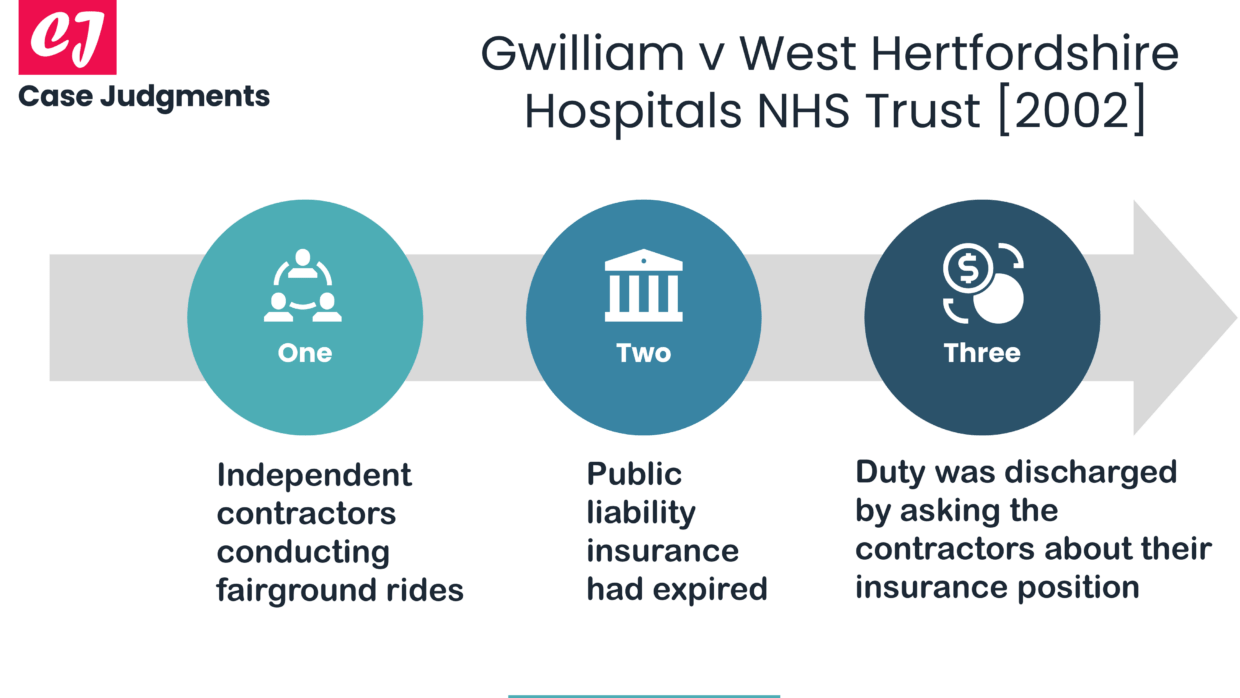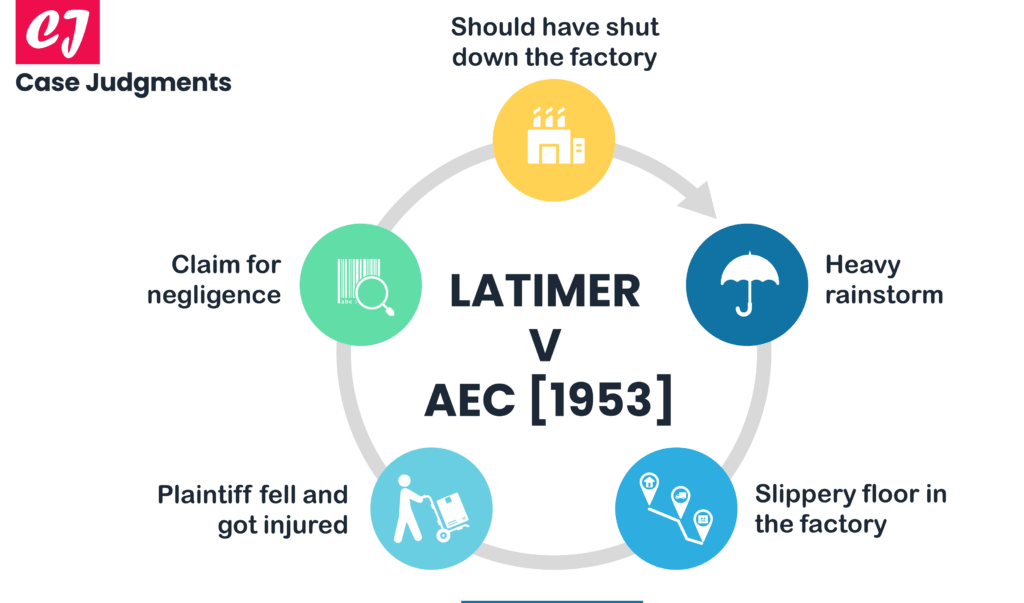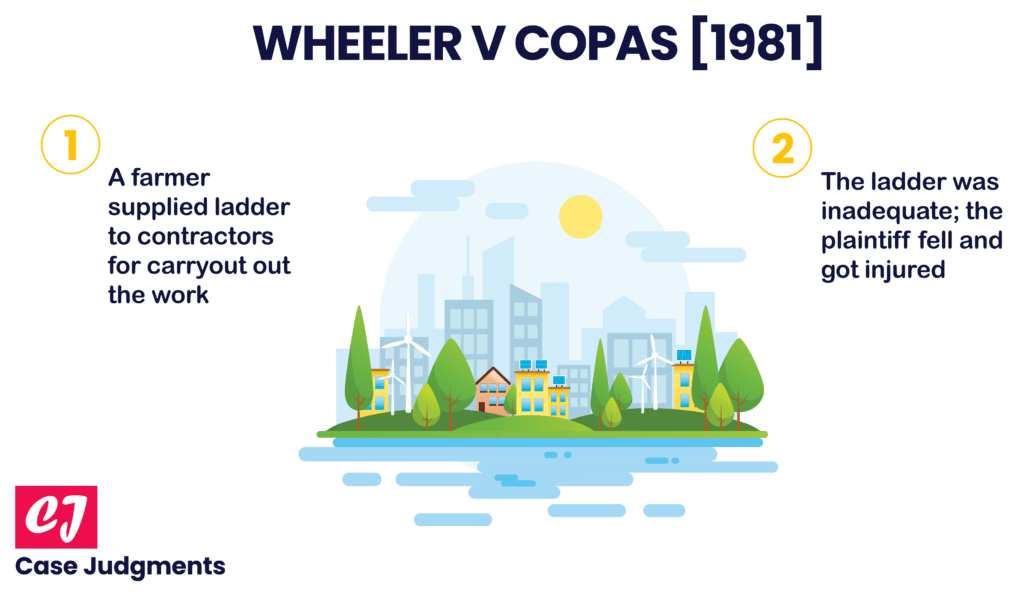
Gwilliam v West Hertfordshire Hospitals NHS Trust [2002]
Gwilliam v West Hertfordshire Hospitals NHS Trust [2002] is a UK tort law case concerning the duty of an occupier to check the insurance position of independent contractors for dangerous activities.
| Case name & citation: | Gwilliam v West Hertfordshire Hospitals NHS Trust [2002] EWCA Civ 1041; [2002] 3 WLR 1425; [2003] QB 443 |
| Court and jurisdiction: | Court of Appeal (Civil Division), England & Wales |
| Decided on: | 24 July 2002 |
| The bench of judges: | Lord Woolf CJ, Lord Justice Waller and Lord Justice Sedley |
| Area of law: | Occupier’s liability; checking the competence of contractors |
Facts of the case (Gwilliam v West Hertfordshire)
A hospital trust had given a contractor permission to run a fundraising fair on its premises that featured a “splat wall.” The visitors would bounce off a trampette and become attached to a wall by means of Velcro material. The splat wall wasn’t functioning properly, which resulted in injury to a visitor. It was later discovered that the contractor’s public liability insurance had expired a few days before the injury and thus, had no cover for the injury.
The settlement between the claimant and the contractor was made for £5000. But the claimant sued the trust in negligence for the difference between the settlement amount and the amount that would have been received had the contractor been insured. It was argued that the hospital owed a duty to take reasonable care in selecting competent contractors and ensuring that they were insured.
Issue
Did the hospital trust owe a duty to check the insurance position of the independent contractors?
Judgment of the Court in Gwilliam v West Hertfordshire
According to the Court of Appeal, the hospital owed a duty to its visitors to keep them reasonably safe from all the activities on its premises. In addition, the hospital had a duty to make sure that independent contractors conducting fairground rides on its premises had enough insurance and were competent. But it was found that the trust had discharged its duty by requiring in its contract with the contractor that the contractor’s insurance ought to cover liability to members of the public using the fairground. In other words, it had discharged its duty by asking the contractors about their insurance position. An actual inspection of the insurance documents to check the validity dates was not needed.
Governing rules behind the decision
Many a time, occupiers can avoid liability for damage caused by their contractors if they take reasonable precautions to ensure the competence of the contractor. Obviously, it is difficult for ordinary people who have no knowledge of technical work to be certain that they are hiring competent individuals, but a simple inquiry, possibly to local trade associations or local authorities, may help to clarify the situation.
As far as insurance is concerned, it might be an important and relevant factor in determining the competence and appropriateness of the contractor for a risky or dangerous event that involves members of the public. Occupiers should take steps, that are reasonably practicable, to check that the contractors/event organizers have adequate public liability insurance. This can be done with simple inquiries from reputable persons/organizations. In normal circumstances, it is not expected of them to ask for insurance papers in evidence.
Another case
Here, you might want to consider another case on similar grounds. This was Bottomley v Todmorden Cricket Club [2003]. The defendants were held accountable for an accident caused by contractors putting on a firework display. Because this was an ‘ultra-hazardous’ activity, the occupiers were required to look into the competency of the contractors as well as whether they were insured. They had failed to fulfill this duty.
List of references:
- http://ndl.ethernet.edu.et/bitstream/123456789/58290/1/12.pdf
- https://cdn.harper-adams.ac.uk/document/profile/150716-Equine-Law236553.pdf
- https://ipsaloquitur.com/tort-law/cases/gwilliam-v-west-hertfordshire-hospitals/
You might also like:
More from tort law:
- A Quick Summary of Haseldine v Daw [1941]
- Rouse v Squires [1973]: A Case Summary
- A Case Summary of Roles v Nathan [1963]
Hope you found this helpful!

